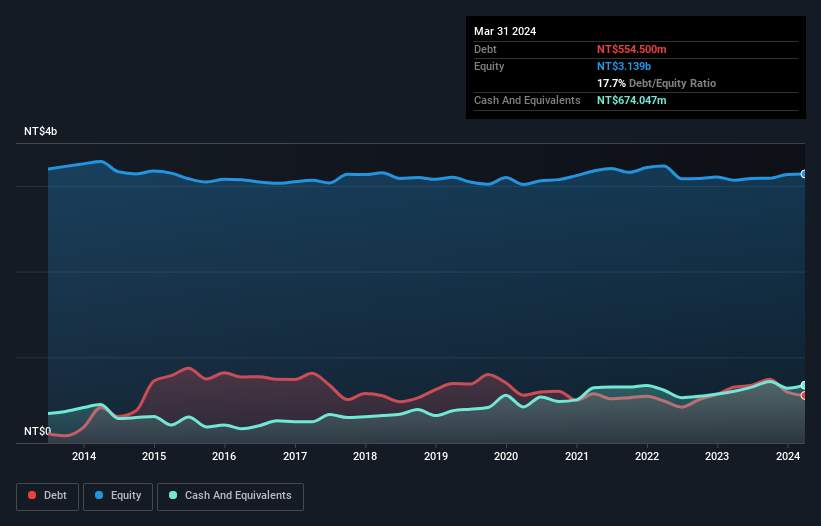Warren Buffett famously said, 'Volatility is far from synonymous with risk.' So it seems the smart money knows that debt - which is usually involved in bankruptcies - is a very important factor, when you assess how risky a company is. We note that Tung Ho Textile Co., Ltd. (TWSE:1414) does have debt on its balance sheet. But the more important question is: how much risk is that debt creating?
When Is Debt A Problem?
Debt assists a business until the business has trouble paying it off, either with new capital or with free cash flow. If things get really bad, the lenders can take control of the business. However, a more common (but still painful) scenario is that it has to raise new equity capital at a low price, thus permanently diluting shareholders. Of course, the upside of debt is that it often represents cheap capital, especially when it replaces dilution in a company with the ability to reinvest at high rates of return. The first step when considering a company's debt levels is to consider its cash and debt together.
Check out our latest analysis for Tung Ho Textile
How Much Debt Does Tung Ho Textile Carry?
As you can see below, Tung Ho Textile had NT$554.5m of debt at March 2024, down from NT$652.5m a year prior. But on the other hand it also has NT$674.0m in cash, leading to a NT$119.5m net cash position.

A Look At Tung Ho Textile's Liabilities
According to the last reported balance sheet, Tung Ho Textile had liabilities of NT$689.4m due within 12 months, and liabilities of NT$681.6m due beyond 12 months. On the other hand, it had cash of NT$674.0m and NT$64.4m worth of receivables due within a year. So its liabilities outweigh the sum of its cash and (near-term) receivables by NT$632.5m.
Since publicly traded Tung Ho Textile shares are worth a total of NT$4.97b, it seems unlikely that this level of liabilities would be a major threat. But there are sufficient liabilities that we would certainly recommend shareholders continue to monitor the balance sheet, going forward. While it does have liabilities worth noting, Tung Ho Textile also has more cash than debt, so we're pretty confident it can manage its debt safely. When analysing debt levels, the balance sheet is the obvious place to start. But it is Tung Ho Textile's earnings that will influence how the balance sheet holds up in the future. So if you're keen to discover more about its earnings, it might be worth checking out this graph of its long term earnings trend.
In the last year Tung Ho Textile had a loss before interest and tax, and actually shrunk its revenue by 12%, to NT$568m. That's not what we would hope to see.
So How Risky Is Tung Ho Textile?
While Tung Ho Textile lost money on an earnings before interest and tax (EBIT) level, it actually booked a paper profit of NT$60m. So when you consider it has net cash, along with the statutory profit, the stock probably isn't as risky as it might seem, at least in the short term. Until we see some positive EBIT, we're a bit cautious of the stock, not least because of the rather modest revenue growth. The balance sheet is clearly the area to focus on when you are analysing debt. But ultimately, every company can contain risks that exist outside of the balance sheet. For example, we've discovered 1 warning sign for Tung Ho Textile that you should be aware of before investing here.
If you're interested in investing in businesses that can grow profits without the burden of debt, then check out this free list of growing businesses that have net cash on the balance sheet.
Valuation is complex, but we're here to simplify it.
Discover if Tung Ho Textile might be undervalued or overvalued with our detailed analysis, featuring fair value estimates, potential risks, dividends, insider trades, and its financial condition.
Access Free AnalysisHave feedback on this article? Concerned about the content? Get in touch with us directly. Alternatively, email editorial-team (at) simplywallst.com.
This article by Simply Wall St is general in nature. We provide commentary based on historical data and analyst forecasts only using an unbiased methodology and our articles are not intended to be financial advice. It does not constitute a recommendation to buy or sell any stock, and does not take account of your objectives, or your financial situation. We aim to bring you long-term focused analysis driven by fundamental data. Note that our analysis may not factor in the latest price-sensitive company announcements or qualitative material. Simply Wall St has no position in any stocks mentioned.
About TWSE:1414
Tung Ho Textile
Engages in processing and spinning of natural fibers and polyester cotton in Taiwan.
Excellent balance sheet with low risk.
Similar Companies
Market Insights
Community Narratives



